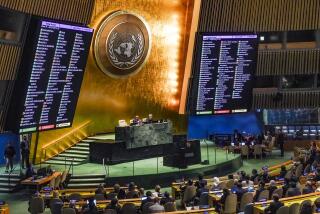U.N. Allows Iraq to Sell $1.6 Billion in Oil
- Share via
UNITED NATIONS — Despite its dispute with Iraq over unrestricted helicopter flights for its inspectors seeking to destroy Baghdad’s war-making potential, the Security Council voted Thursday to let the Iraqis sell their first oil since the Gulf War broke out.
The $1.6 billion in proceeds are to go totally for Iraq’s humanitarian needs and war costs.
Abdul Amir Anbari, Iraq’s U.N. envoy, immediately complained that the action infringes on his country’s sovereignty and is unworkable.
But Baghdad is expected to go along with the Security Council because it has little choice. The alternative, said French Ambassador Jean-Bernard Mirimee, the Security Council president, is to “deliberately choose to see people starve.”
Iraq also appears to have little choice but to accept the Security Council’s demand earlier this week for full cooperation with U.N. inspectors, who are seeking and destroying its weapons of mass destruction, including ballistic missiles.
Iraqi President Saddam Hussein ignored the Security Council’s request for a reply by Thursday over how he plans to resolve a running dispute about providing U.N. inspectors with unrestricted helicopter flights so that they can fulfill their mission. But U.N. and Western officials declined to characterize their request for a speedy reply as a deadline. They appeared to expect Baghdad to give a positive response soon.
Meanwhile, U.N. inspectors were reported preparing to re-enter Iraq from Bahrain this weekend to search for nuclear and biological weapon facilities.
The United States and other coalition partners have said they are ready to provide fighter jet escorts for helicopters carrying U.N. inspectors, if necessary to prevent interference by the Iraqis with their work. It was unclear, however, whether they are prepared to do so this weekend.
Security Council members insisted that the arms-inspection issue is unrelated to the oil-sales decision.
Under terms of the Security Council decision, Iraq may now begin to sell as much as $1.6 billion in the next six months through its pipeline that runs through Turkey. This is about half its potential rate of production, according to documents submitted to the United Nations.
More than one-third of that sum--$666 million--will be needed by the end of March, 1992, to pay for Iraqi compliance with U.N. weapons inspections and monitoring of Iraq’s borders, Secretary General Javier Perez de Cuellar has reported. The rest will be earmarked for the Iraqis to buy food and medicines and to protect public health--for instance, to purchase water-purification chemicals.
More to Read
Sign up for Essential California
The most important California stories and recommendations in your inbox every morning.
You may occasionally receive promotional content from the Los Angeles Times.










